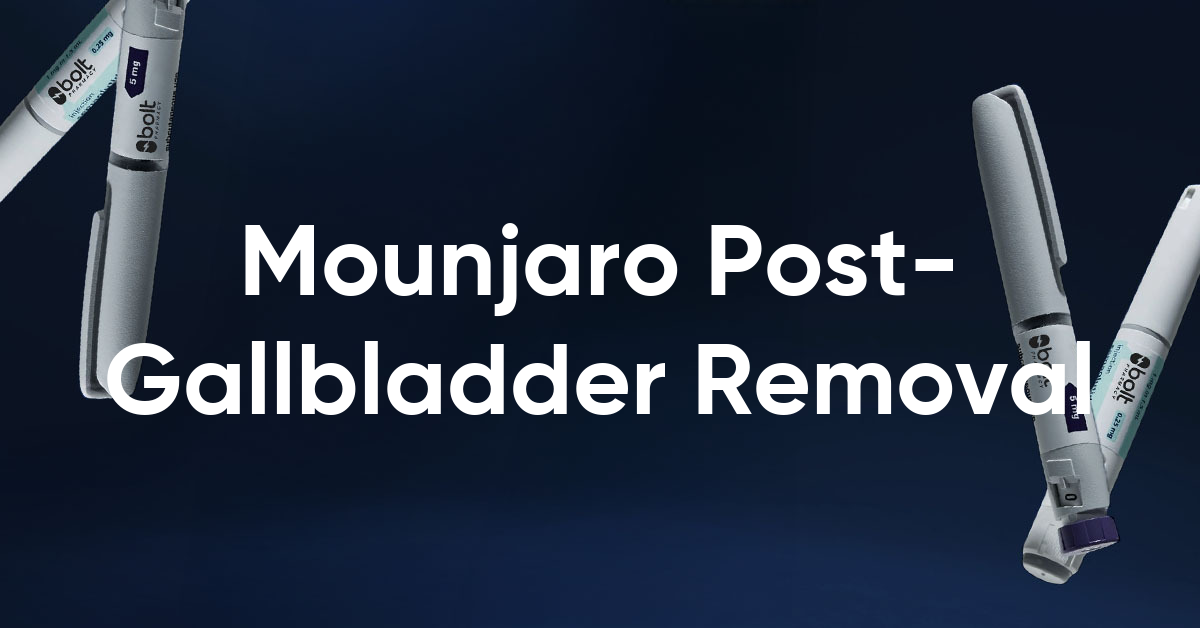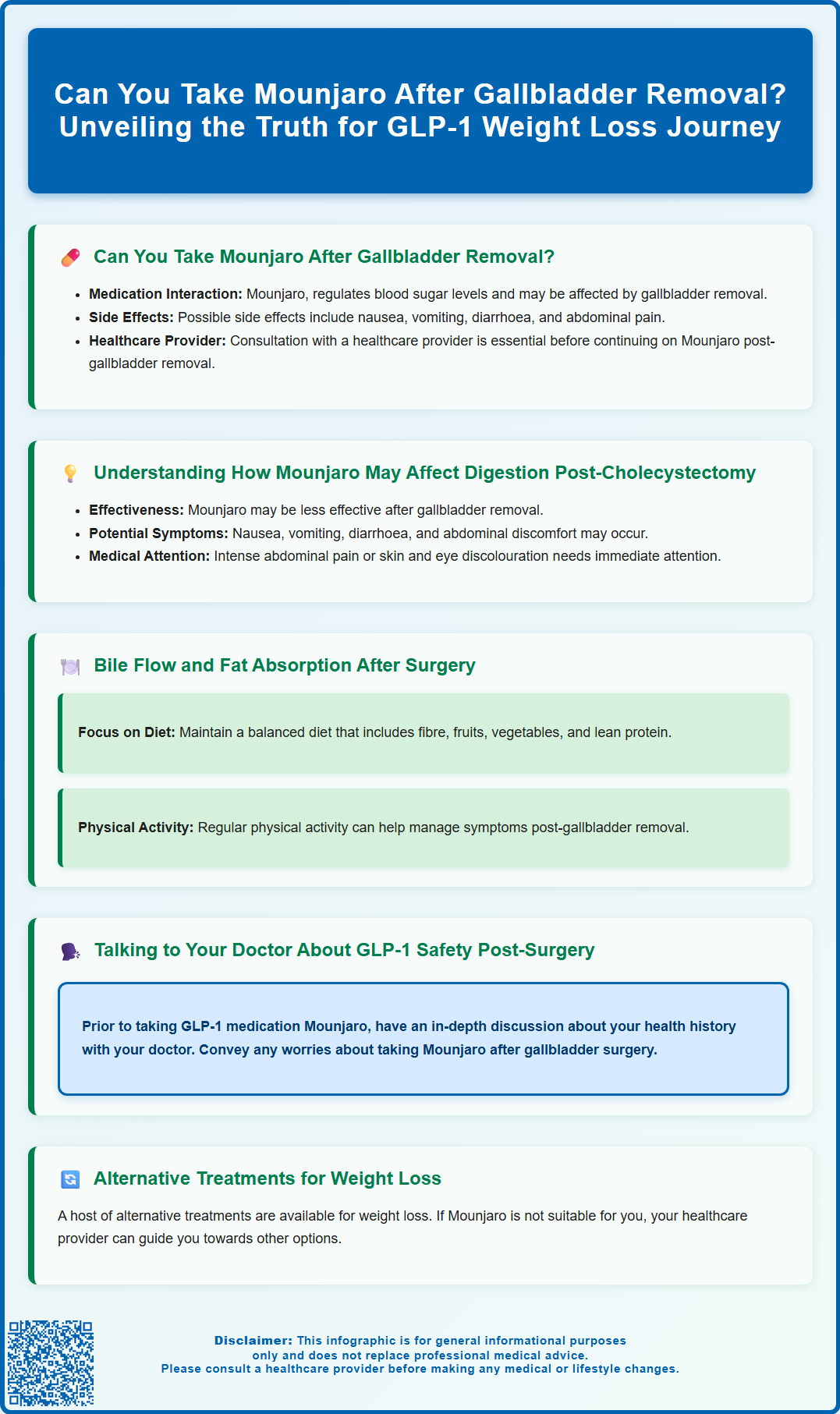
Mounjaro (tirzepatide) can generally be taken safely after gallbladder removal, with no absolute contraindication for post-cholecystectomy patients. This dual GLP-1 and GIP receptor agonist, licensed in the UK for type 2 diabetes management, requires careful consideration of your individual digestive function and medical history. After gallbladder removal, bile flows continuously into the intestine rather than being stored and released with meals, which may influence how you tolerate medications affecting gastrointestinal function. Your healthcare provider will assess whether Mounjaro is appropriate for your circumstances, considering factors such as your current digestive symptoms, diabetes control, and overall health status.
Summary: Mounjaro (tirzepatide) can generally be taken after gallbladder removal, as there is no absolute contraindication for post-cholecystectomy patients.
Mounjaro (tirzepatide) can generally be taken after gallbladder removal, also known as cholecystectomy. There is no absolute contraindication to using this medication in patients who have undergone this common surgical procedure. However, the decision to prescribe Mounjaro following gallbladder removal requires careful consideration by your healthcare provider, taking into account your individual medical history, current digestive function, and overall health status.
The gallbladder stores and concentrates bile produced by the liver, releasing it to aid fat digestion. After its removal, bile flows continuously from the liver directly into the small intestine rather than being stored and released in response to meals. This anatomical change can affect how your body processes dietary fats and may influence your digestive tolerance to certain medications, including those that affect gastrointestinal function.
Mounjaro is a glucagon-like peptide-1 (GLP-1) and glucose-dependent insulinotropic polypeptide (GIP) receptor agonist licensed in the UK for the treatment of type 2 diabetes mellitus. The Medicines and Healthcare products Regulatory Agency (MHRA) has approved its use, and it is increasingly prescribed for glycaemic control. According to the UK Summary of Product Characteristics (SmPC), it's important to note that even after gallbladder removal, patients should be aware of potential acute biliary disease and pancreatitis risks. Caution is also advised in patients with a history of pancreatitis or severe gastrointestinal disease. Whilst the absence of a gallbladder does not preclude Mounjaro's use, patients may experience different digestive responses compared to those with an intact gallbladder, particularly during the initial treatment period when gastrointestinal side effects are most common. Your prescribing clinician will assess whether Mounjaro is appropriate for your circumstances and monitor your response carefully.

Mounjaro works through a dual mechanism of action, activating both GLP-1 and GIP receptors. These are incretin hormones that play crucial roles in glucose metabolism and appetite regulation. By stimulating these receptors, tirzepatide primarily enhances insulin secretion in a glucose-dependent manner and suppresses inappropriately elevated glucagon secretion. It also slows gastric emptying, which contributes to improved glycaemic control and weight reduction, particularly in the early stages of treatment, though this effect may attenuate over time.
The slowing of gastric emptying means food remains in the stomach for longer periods before passing into the small intestine. This physiological effect can reduce appetite and promote satiety, which contributes to the medication's effectiveness in managing type 2 diabetes and supporting weight loss. However, this delayed transit can also lead to feelings of fullness, nausea, and other digestive symptoms, particularly when treatment is initiated or the dose is increased.
Importantly, the UK SmPC highlights that Mounjaro can reduce the rate of absorption of oral medications. This is particularly significant for women using oral contraceptives, who should use additional contraceptive methods for 4 weeks after initiating Mounjaro and after each dose increase. This precaution ensures continued contraceptive efficacy during periods when medication absorption may be affected.
For individuals without a gallbladder, the continuous flow of bile into the intestine, combined with Mounjaro's effect on gastric emptying, may create a different digestive environment. The absence of concentrated bile release coordinated with meals can affect fat digestion, whilst the medication's slowing of gastric emptying may alter the timing and nature of digestive processes. Understanding these mechanisms helps explain why careful dose titration and dietary modifications may be particularly important for those who have undergone cholecystectomy.
The most common side effects of Mounjaro affect the gastrointestinal system and include nausea, diarrhoea, vomiting, constipation, abdominal pain, and reduced appetite. These effects are typically most pronounced during the first few weeks of treatment and often diminish as the body adapts to the medication. In clinical trials, gastrointestinal adverse events were reported by a significant proportion of patients, though most were mild to moderate in severity and transient in nature.
Patients without a gallbladder may theoretically experience these gastrointestinal effects differently, though there is limited evidence to establish a clear link between cholecystectomy and increased Mounjaro side effects. The continuous bile flow characteristic of post-cholecystectomy physiology can sometimes cause loose stools or diarrhoea independently, a condition known as bile acid diarrhoea or post-cholecystectomy syndrome. The British Society of Gastroenterology provides guidance on diagnosing and managing this condition, which may require specific assessment (such as SeHCAT testing) and treatment if persistent.
It's important to note that hypoglycaemia risk increases when Mounjaro is used alongside insulin or sulfonylureas; your healthcare provider may need to reduce doses of these medications when starting tirzepatide. Additionally, persistent vomiting or diarrhoea can lead to dehydration and acute kidney injury, so maintaining adequate fluid intake is essential. Patients with pre-existing diabetic retinopathy should be monitored closely, as rapid improvements in blood glucose can temporarily worsen retinopathy.
According to the UK SmPC, all patients taking Mounjaro should be vigilant for signs of acute pancreatitis (severe abdominal pain, often radiating to the back, accompanied by vomiting) and seek urgent medical attention if these occur, even after gallbladder removal. Many patients tolerate Mounjaro well after cholecystectomy, but monitoring your individual response and maintaining open communication with your healthcare team allows for appropriate management strategies to be implemented if needed.
Before starting Mounjaro after gallbladder removal, your GP or specialist will conduct a thorough assessment of your medical history, current medications, and digestive function. This evaluation should include discussion of any ongoing digestive symptoms you experience following your cholecystectomy, such as diarrhoea, bloating, or difficulty tolerating certain foods. Your healthcare provider will also review your diabetes control, weight management goals, and any other relevant health conditions that might influence treatment decisions.
According to NICE guideline NG28 on type 2 diabetes management and the specific NICE Technology Appraisal for tirzepatide, GLP-1 receptor agonists like Mounjaro may be considered as part of a comprehensive treatment strategy when glycaemic targets are not achieved with other therapies or when weight loss would provide significant clinical benefit. The decision to prescribe should be individualised, taking into account factors such as HbA1c levels, body mass index, cardiovascular risk, and patient preferences. For those who have undergone cholecystectomy, additional consideration of digestive tolerance is prudent.
When initiating Mounjaro, the standard approach involves starting with a low dose and gradually increasing it over several weeks. According to the UK SmPC, treatment begins at 2.5 mg once weekly for 4 weeks, then increases to 5 mg weekly. The dose can then be increased by 2.5 mg every 4 weeks or more, as tolerated, to a maximum of 15 mg weekly. This titration schedule helps minimise gastrointestinal side effects. For patients without a gallbladder, this gradual approach may be particularly important, allowing time to assess digestive tolerance at each dose level.
If you are taking insulin or sulfonylureas, your doctor may reduce these doses when starting Mounjaro to prevent hypoglycaemia. Women of childbearing potential should note that Mounjaro is not recommended during pregnancy or breastfeeding, and additional contraceptive methods are advised for 4 weeks after starting treatment and after each dose increase. Regular follow-up appointments enable monitoring of both therapeutic response and side effects, with adjustments made as necessary to optimise your treatment whilst maintaining tolerability.
Effective management of digestive symptoms whilst taking Mounjaro after gallbladder removal involves a combination of dietary modifications, lifestyle adjustments, and appropriate medical support. Eating smaller, more frequent meals rather than large portions helps accommodate the delayed gastric emptying caused by Mounjaro. Reducing dietary fat intake, particularly avoiding high-fat meals, can minimise digestive stress for those without a gallbladder whilst also reducing nausea and bloating associated with the medication.
Choosing easily digestible foods, particularly during the initial weeks of treatment, supports better tolerance. Lean proteins, well-cooked vegetables, whole grains, and adequate hydration form the foundation of a digestive-friendly diet. Maintaining good hydration is especially important to prevent dehydration and reduce the risk of acute kidney injury if you experience vomiting or diarrhoea. Some patients find that keeping a food diary helps identify specific triggers that worsen their symptoms, allowing for more targeted dietary adjustments.
If digestive symptoms become troublesome despite these measures, contact your GP or diabetes specialist nurse. They can assess whether symptoms are within the expected range for Mounjaro or whether additional investigation or intervention is needed. In some cases, temporary use of anti-nausea medication or adjustments to the dose titration schedule may be appropriate under medical supervision. For persistent bile acid diarrhoea, your GP may refer you to a gastroenterologist for assessment (potentially including SeHCAT testing) and consider bile acid sequestrants such as colestyramine.
You should seek urgent medical attention via NHS 111, 999, or A&E if you experience severe, persistent abdominal pain (particularly if radiating to the back), repeated vomiting, signs of dehydration, or blood in stools, as these could indicate pancreatitis or other serious complications. According to the UK SmPC, Mounjaro should be discontinued immediately if pancreatitis is suspected. Regular monitoring and open communication with your healthcare team ensure that any issues are addressed promptly, allowing you to gain the metabolic benefits of Mounjaro whilst maintaining acceptable digestive comfort and quality of life.
Yes, Mounjaro (tirzepatide) can generally be used safely after gallbladder removal, as there is no absolute contraindication. Your healthcare provider will assess your individual digestive function and medical history to determine if it's appropriate for you.
While Mounjaro commonly causes gastrointestinal side effects like nausea and diarrhoea, there is limited evidence that these are significantly worse in post-cholecystectomy patients. Gradual dose titration and dietary modifications can help manage symptoms effectively.
Seek urgent medical attention via NHS 111, 999, or A&E if you experience severe, persistent abdominal pain, particularly if radiating to the back, as this could indicate pancreatitis or other serious complications requiring immediate assessment.
The health-related content published on this site is based on credible scientific sources and is periodically reviewed to ensure accuracy and relevance. Although we aim to reflect the most current medical knowledge, the material is meant for general education and awareness only.
The information on this site is not a substitute for professional medical advice. For any health concerns, please speak with a qualified medical professional. By using this information, you acknowledge responsibility for any decisions made and understand we are not liable for any consequences that may result.
Lorem ipsum dolor sit amet, consectetur adipiscing elit, sed do eiusmod tempor incididunt ut labore et dolore magna aliqua. Ut enim ad minim veniam, quis nostrud exercitation ullamco laboris nisi ut aliquip ex ea commodo consequat. Duis aute irure dolor in reprehenderit in voluptate velit esse cillum dolore eu fugiat nulla pariatur.
Block quote
Ordered list
Unordered list
Bold text
Emphasis
Superscript
Subscript